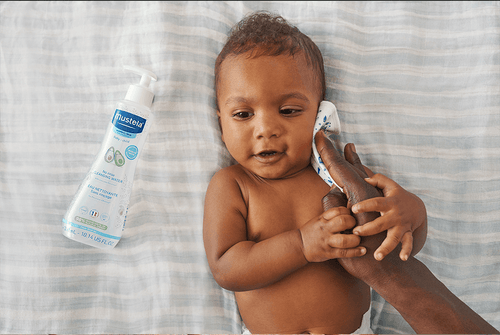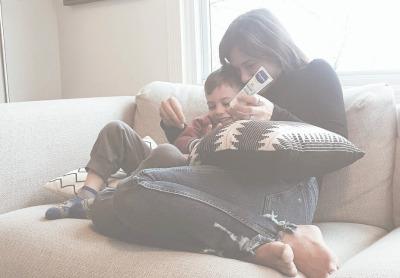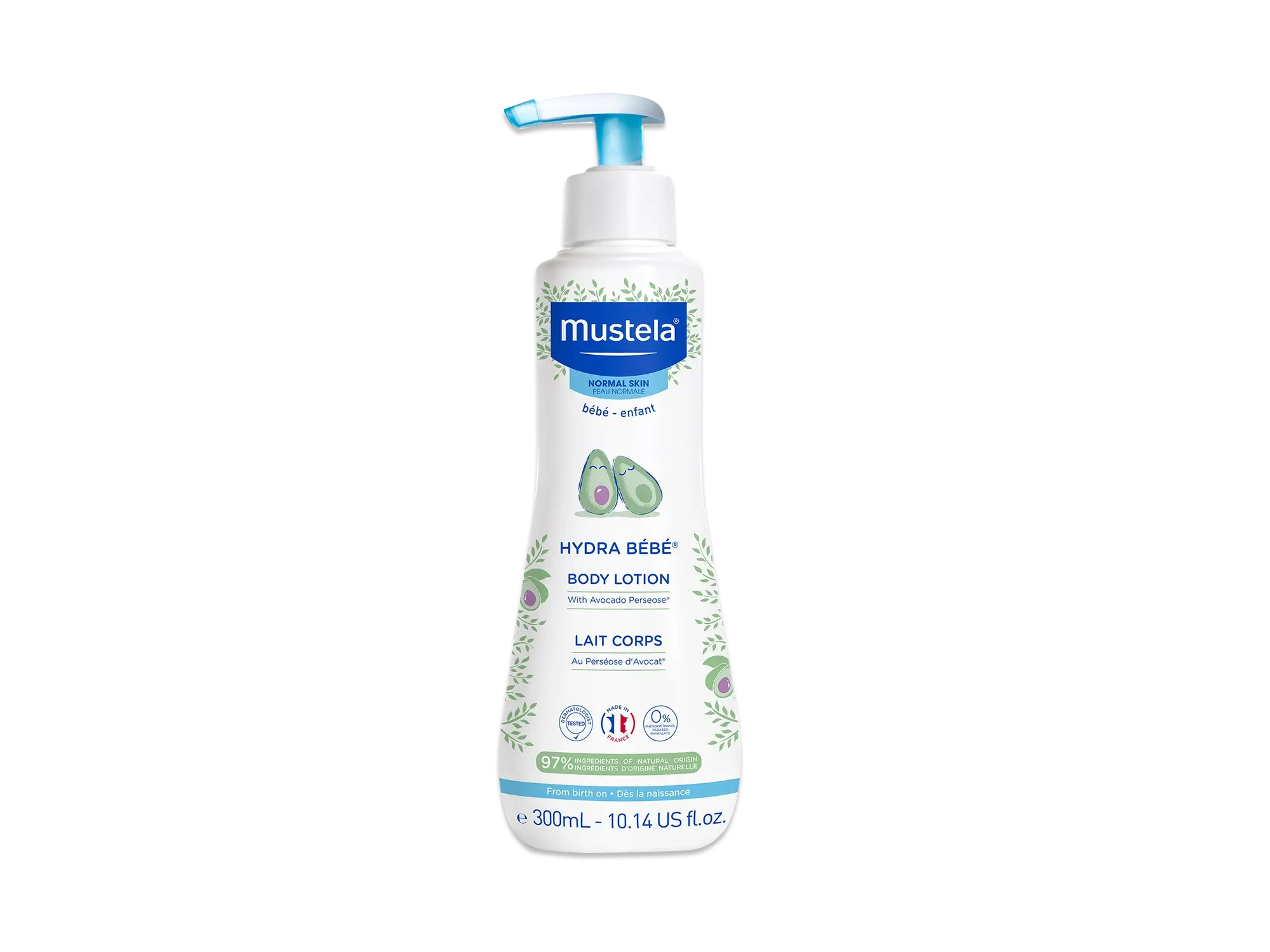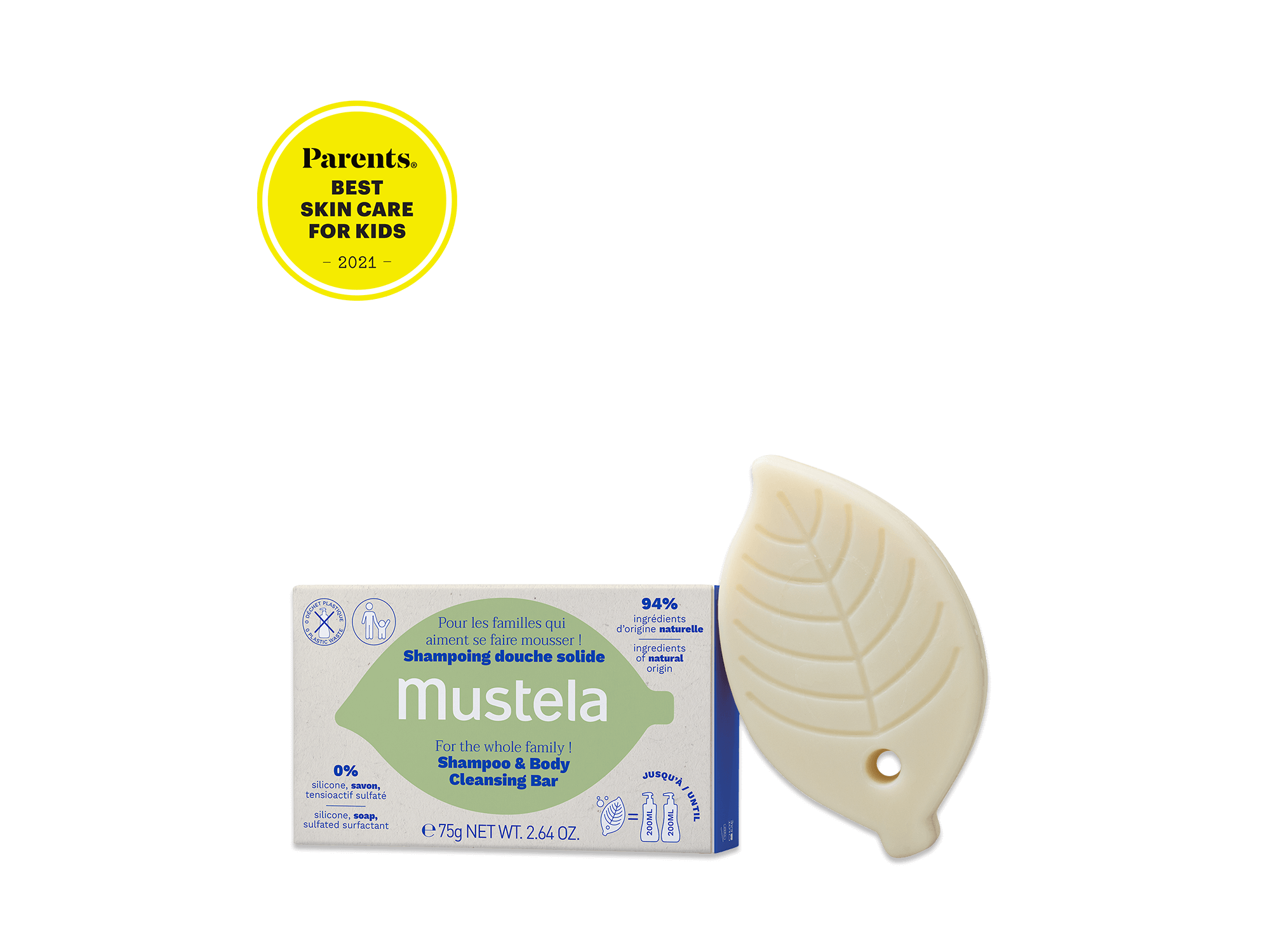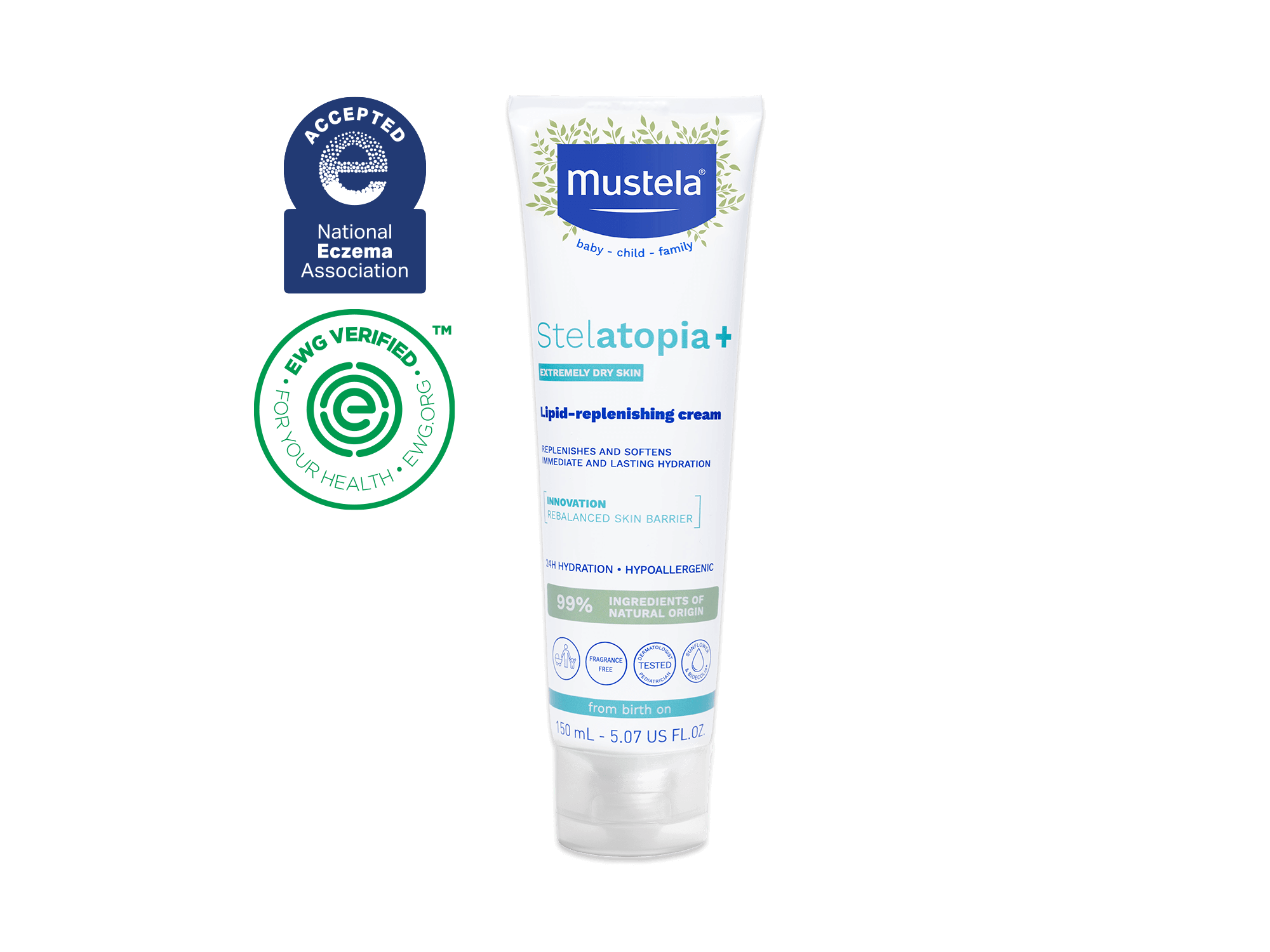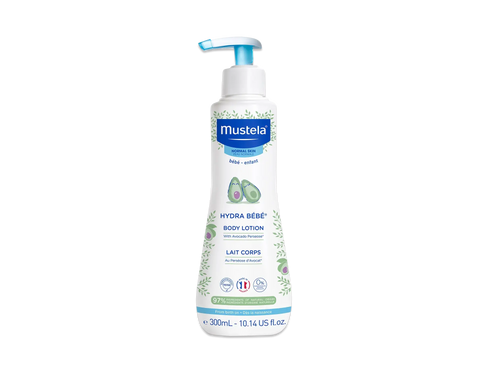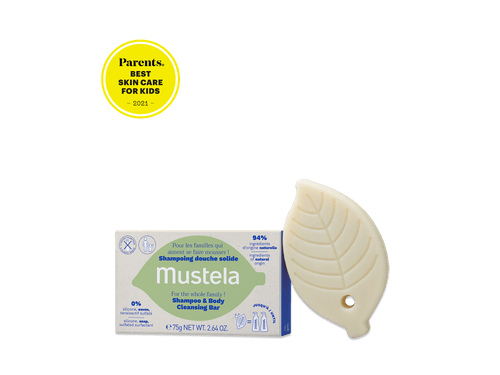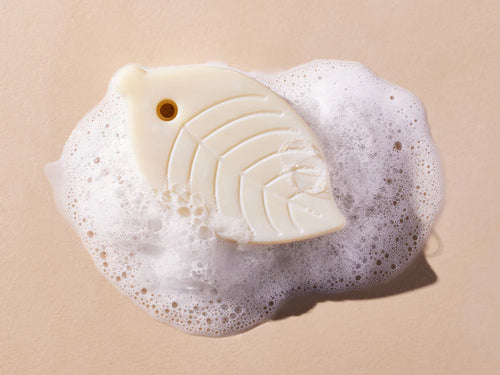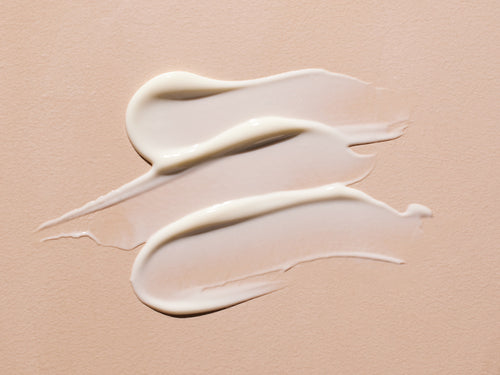Realizing that your baby has developed a cough can be alarming. On top of that, it’s often tough to determine the cause of your baby’s cough and how serious the condition is. Before you get too worried, remember that a cough on its own is often not a sign of a severe illness.
In this post, the experts at Mustela will explore the different conditions that may be causing your baby’s cough, what the sound of your baby’s cough might indicate, and how to best care for your little bundle of joy.

What Causes A Cough?
A cough is a natural reflex caused by an irritant in the respiratory system. The irritant may be an environmental factor such as dust, pollen, or smoke, or it may be an inflammation of the larynx, trachea, bronchi, or alveoli.
What you might not know is that a cough is actually a natural defensive measure taken by the body to clear the airways. While a cough may be an indication of illness, it’s important to remember that it’s also a sign that the body is protecting itself.

What Might Be Making Your Baby Cough?
The Common Cold Or The Flu
Most of the time, the common cold or the flu will be the cause of your baby’s cough. As both of these conditions are caused by viruses, there are no quick cures. Antibiotics aren’t always effective, as they only kill bacteria.
While seasonal vaccinations exist to prevent the flu, they can only be given to babies over six months old, according to the Mayo Clinic. Always check with your pediatrician to determine if seasonal vaccines are right for your baby.
The best thing to do for your little one when they have a cold or the flu is to treat the symptoms and wait for their immune system to suppress the virus.
Allergies
Allergies are another frequent cause of coughs in young children. If you have pets, animal dander may be the problem. If it’s springtime, pollen from blooming trees and flowers might be the underlying cause.
Try giving your home a good sweeping and a deep cleaning to ensure that the air and surfaces in the areas where your baby spends most of their time are free of irritants.
Finally, always make sure that your baby isn’t being exposed to smoke, exhaust, or pollution.
Bronchitis
Bronchitis is an inflammation of the bronchi, the large- and medium-sized air passages in the lungs. It is estimated that about 6% of children get bronchitis every year. Like the common cold and influenza, bronchitis is a viral infection, so it cannot be treated with antibiotics.
Most cases of bronchitis pass on their own in seven to ten days.
Pneumonia
Pneumonia is an inflammation of the alveoli, the tiny air sacs in the lungs. This condition can be caused by either a bacterial or viral infection. A vaccination for bacterial pneumonia, known as PCV13, is available and considered safe for babies older than two months.
As for viral pneumonia, like the common cold and the flu, there are no vaccinations or cures.
Asthma
Asthma is a chronic condition caused by inflammation in the airways of the lungs. According to data from the CDC, 4.7% of kids under the age of five had asthma in 2015.
Asthma causes short episodes of intense coughing. These coughing fits may be caused by dust, pollen, animal dander, smoke, pollution, or strenuous exercise. Asthma often gets worse at night, so if your baby frequently has fits of coughing at night, but rarely during the day, it may be a sign that your child is asthmatic.
Croup
Croup is an infection of the trachea, commonly referred to as the windpipe. Since the infection is higher up in the respiratory system, rather than deeper down in the lungs, it often produces a cough that sounds like a bark. Croup is a viral infection, but it is typically short-lived and is normally gone in four to five days.
Whooping Cough
Whooping cough, officially called pertussis, is a highly contagious bacterial infection. Symptoms of whooping cough include violent episodes of coughing that cause chest pain, vomiting, or exhaustion. Antibiotics are effective in treating whooping cough and normally cure the illness in roughly a week.
Additionally, there is a series of vaccinations for whooping cough that the pediatrician can begin administering once your baby is two months old.
RSV
Respiratory syncytial virus, more commonly known as RSV, is a type of virus that infects the respiratory tract. This virus affects children who are two years of age or younger but, even though it’s highly contagious, will most likely cause nothing more than a common cold in most children.
However, keep a close eye on your little one. If their symptoms become more severe, such as wheezing or difficulty breathing, see a doctor right away.
RSV typically subsides anywhere between two and eight days, but symptoms can last up to three weeks. The winter months and early springtime are when children are most susceptible to RSV.
If your child has a weakened immune system or severe symptoms, they can inhale a type of antiviral medicine through a breathing machine nebulizer to treat their symptoms. The nebulizer machine takes a liquid solution and turns it into a mist that can be inhaled through the nose by using a mouthpiece or face mask to reach the lungs.
While steroids have been proven effective in treating most types of coughs associated with asthma and croup, they are not effective with coughs associated with RSV.
Reflux
Infant reflux might be the culprit of your little one’s cough...as odd as it may sound. This is because food can back up from your baby’s stomach and cause them to spit up. Coughing is one of the main symptoms of reflux in infants and young children.
Pay attention to when you notice your child’s coughing spells. If they occur near or right after feedings, reflux could be the cause of your baby’s cough.
Treatments for reflux include:
- Elevating the head of your baby’s crib or bassinet
- Holding your baby upright for at least 30 minutes after a feeding
- Feeding your baby frequently with smaller amounts of food

What Kind Of Cough Does Your Baby Have?
There are a number of different types of coughs that your baby might be experiencing. It’s important to identify the type of cough your child has, since different kinds of coughs often indicate different illnesses. Here is a list of the most common coughs and how to recognize them:
Dry, Itchy Cough
This is the raspy, scratchy cough that makes the back of the throat itch when breathing or swallowing. A dry, itchy cough may be accompanied by a stuffy nose, a sore throat, and/or a low fever. A dry cough does not bring up mucus and is most often caused by a cold, the flu, or allergies.
Wet, Mucousy Cough
A wet, mucousy cough is easily recognizable because it often causes your baby to produce phlegm when coughing. There may be a gurgling sound as your baby is coughing, which is mucus being pushed through the airways.
Wet coughs are often seen with runny noses, watery eyes, and/or small appetites and may be a sign of bronchitis or pneumonia.
Wheezing Cough
As you might have guessed from the name, wheezing noises when your baby is coughing, or even just breathing in and out, means that your baby has a wheezing cough. Wheezing coughs occur with colds, bronchitis, and pneumonia.
While slight wheezing noises are nothing to be alarmed about, take your baby to a doctor immediately if they are having serious difficulty breathing.
Short, Barking Cough
A barking cough is a short cough that sounds similar to the bark of a seal or small dog. The coughs are caused by a fast, powerful rush of air coming from your child’s windpipe. Barking coughs are ordinarily caused by croup.
Whooping Cough
Whooping coughs are identified by long, intense episodes of coughing that cause your child to make whooping sounds. The whooping cough is most often caused by the illness of the same name. It’s best to take your child to the doctor if they have whooping cough, as it is often easily treated with antibiotics.
Stridor
Wheezing usually occurs when your child exhales (breathes out). Stridor, on the other hand, occurs when your child inhales (breathes in). With stridor, you’ll notice noisy, harsh breathing.
This type of cough is caused by swelling of the upper airway as a result of croup. Sometimes it can be caused by a more serious infection or by an object stuck in the airway. Call your child’s doctor right away if you notice signs of a stridor cough in your little one.
Nighttime Cough
Most often, your little one’s cough will get worse at night. This is due to the draining congestion from your child’s nose and sinuses, which causes irritation when your child lies down. This type of cough can become a problem if your little one can’t sleep.
How To Best Treat Your Baby’s Cough
When caring for your baby when they have a cough, you should never give them any over-the-counter cold medicines. The FDA has issued several warnings that OTC cough and cold medications are not safe for children under the age of 2.
If your child is two or three years old, it’s still best to check with your doctor before giving them any cough or cold medicine.
Chest rub can help soothe and prepare your baby for a good night’s sleep. Use chest rub to treat your baby’s cough by gently massaging it onto your baby’s chest to ease breathing discomfort. It will help calm and relax your little one.
Remember, the best way to treat your baby is to address the symptoms and make sure they are as comfortable as possible. Here are some other great ways to comfort your baby while their body fights off the illness:
- Warm liquids: Soothes the throat and replenishes fluids lost from coughing and sneezing
- Chicken noodle soup: Eases discomfort in the throat and leaves the tummy happy
- Hygiene: Prevent the spread of germs by washing your baby’s hands and nose regularly
- Saline nasal drops: Helps to clear the sinuses and makes breathing easier
- A small spoonful of honey: Helps to clear the sinuses and makes breathing easier * (Note: Pediatricians recommend waiting until your baby is at least 12 months before introducing honey.)
- Use a humidifier: Relaxes the throat, windpipe, and lungs. It is also good for the skin
- Cool air: Reduces irritation to the respiratory system
- Acetaminophen and Ibuprofen: For babies over six months old and weighing at least 12 pounds, small doses of these medications can be given to ease aches and pains
- Adjust sleeping position, such as raising the head of your little one’s crib or bassinet
- Rest: Nothing helps the body heal like good, old-fashioned rest

When To Take Your Baby To The Doctor
Most of the time, the common cold or the flu is the cause of your baby’s cough. These illnesses are caused by viruses, so there’s not much a doctor can do to cure your baby. Your best option is often to wait for the virus to run its course and let your child’s immune system do the work.
With that said, there are certainly times when you should take your baby to see a physician:
- Fever: A fever of 100.4°F or higher in infants under three months old, or a fever of 101°F or higher in babies between six months and three years old
- Difficulty Breathing: Trouble breathing, especially trouble with inhaling
- Fast Or Erratic Breathing: Extremely fast and shallow breaths, or erratic breathing that includes long pauses between breaths
- Discolored Lips: Blue or purple lips
- Discolored Phlegm: Black phlegm or phlegm with streaks of blood
- Whooping Sounds: A whooping sound during intense coughing fits
- Long-Term Cough: A cough or cold symptoms that last more than a week
Soothing Your Baby’s Cough

All babies will develop a cough at some point. While it’s a struggle to see your little one in discomfort, the illness will pass soon enough. In the meantime, there are many things you can do to help your baby feel better.
And don’t forget to give your precious baby plenty of hugs and kisses. Nothing makes a child feel better like a little extra TLC from Mom and Dad!

